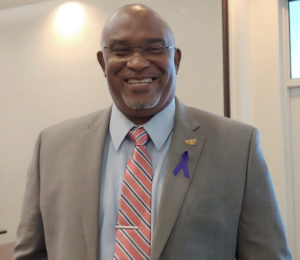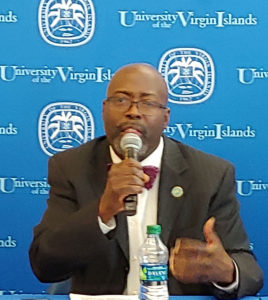
The unearthly wail from deep inside a mother who has, in the flash of a speeding bullet lost her child, is like no other sound, according to Ray Martinez, who has experienced that audible ache way too many times in his career in law enforcement.
“I was the second officer on the scene of a homicide,” Martinez told several dozen people Tuesday afternoon at the University of the Virgin Islands. “There was yellow tape marking off the crime scene when I arrived.”
A few yards away were family members.
“There was the mother, the pitch of her wailing increasing with every moment that passed.”
“When she calmed down enough to speak she begged, ‘Please, please just let me cross the tape and hold my child – kiss him one more time – while his body is still warm.’”
But Martinez couldn’t grant that mother’s one wish or the wishes of any of the mothers who asked for the same thing over the years. That warm body – that mother’s son – was in police parlance “evidence.” And the yellow tape was the boundary separating the crime scene from a family in shock and grief.
Martinez, who headed investigations for the V.I. Police Department as well as internal affairs for more than a decade, was the last speaker on the daylong agenda at a summit on violence prevention sponsored by UVI and the Office of the Governor.
The Nonprofit Violence Prevention Summit gathered members of public and private agencies tasked with violence prevention, enforcement, advocacy and victims support in the community.
According to several experts in the field, on any given day the victim could just as easily have been the perpetrator instead. And therein may lie the answer to reducing the gun violence.
As much as 70 percent of the homicides are retaliatory and involve members of rival groups. Why they are rivals remains a mystery, but a clue to the general state these young men, and sometimes women, find themselves in that is backed up by years of studies may be as simple as hopelessness.
Sgt. Richard Dominguez, who along with working for the VIPD also serves on the FBI Gang and Violence Crime Task Force, offered a telling statistic. From Sept. 16, 2017, to Jan. 6, 2018, the V.I. did not log one homicide.
“That is 112 days,” Dominguez said. “Do you know why?” Back-to-back hurricanes Irma and Maria seemed the simple answer. But there was more.
“They had other stuff to do,” Dominguez said, like work. “There was full employment; they stopped hanging out with the same idiots.”
One of the major things Tuesday’s presenters agreed upon with few exceptions was that increased policing and imprisonment is not the answer. This conclusion has arisen over the last decade as city after city has failed using old fashioned punitive policing techniques including stop and frisk and the “broken windows” model.
“Its not about catching them,” Dominguez said. “It’s about preventing the next body from falling.”
One of the ways that is done is by interruption. When community members and enforcement personnel know who the group members are, often they can go to the rivals and try to stop the retaliation. This method – developed over many years by National Network for Safe Communities out of John Jay School in New York City – has been wildly effective in cities across the country. Dominguez has seen it firsthand in those cities due to his relationship with NNSC.
Meanwhile, with 26 homicides logged in the USVI so far this year, the territory is back on track after that 112 day respite to make its average of 40 or more killings by the end of the year.
But the numbers only tell a small part of the story, Dominguez warned.
There to tell the full-color, true-life story were two women who have firsthand experience with loss; one having lost a son, the other a father to gun violence.
Blanche Frazer’s son David Payne – an Ulla Mueller Elementary School teacher – was shot and killed just feet from his home on Sept. 7, 2012. His mother said in a short interview after Tuesday’s meeting her son had asked a group of young men gathered nearby if they would kindly extinguish whatever they were smoking because the fumes were wafting toward his house and family. Payne, who was 30 years old, died of multiple gunshot wounds. A teenager was arrested soon after and charged with first-degree murder.
Shirley Jackson McDonald, a preacher and the sister of Sen. Myron Jackson, made a rare public statement toward the end of the summit about her father Hugo Jackson, who was killed in a robbery attempt at his gas station in the Pollyberg area of St. Thomas 37 years ago.
“I was 19 years old,” she said. “And I was a daddy’s girl.”
Jackson’s high profile killing stunned the community in February 1982. Murders were rare, as were guns.
On Tuesday, McDonald revealed something publicly for the first time. She said her father had seen the current state of violence building. “Not long before he died,” she said “he told me there was going to be a bloodbath.”
In the decades since, Hugo Jackson’s prediction has come to pass.
It is the cold-hearted acceptance of unprecedented levels of violence that is at the core of inaction, according to several of the day’s speakers.
In his opening remarks Tuesday morning, Gov. Albert Bryan Jr. admitted that his attitude toward most of the territory’s homicides had been apathetic.
“I used to be one of those people who said, ‘Let them all kill each other.’”
That was until his friend Terry Moorhead was shot and killed on his way to a convenience store one evening.
“That changed everything for me,” Bryan said, adding, “We lock people up more than most places in the world; gun control has totally failed. There has to be something else.”
Many of the folks attending Tuesday’s meeting experienced deja vu.
“We’ve been here before. In this very room,” one participant remarked to nodding heads.
The university and local Rotary clubs – and others – have held symposiums, developed programs and strategies, paid for studies, brought in speakers, particularly over the last five or six years, and held hope for a little while that those things would change the culture of violence the territory has become numb to.
The conclusions that most of those efforts reached: greater policing is the problem, not the solution; more and harsher sentencing and imprisonments has made no difference.
Dominguez was clear, harsher laws were not a deterrent and the numbers of incarcerated people bears him out.
Throwing money at the problem doesn’t help either, Bryan said.
“We just give away money and then go home and feel good,” he said.

Police Commissioner designee Trevor Velinor said conflict resolution training throughout the territory in schools and agencies is proven to work, unlike tougher gun laws and sentencing.
“We can’t lock ourselves out of this dilemma,” said Velinor, who was with the Bureau of Alcohol, Tobacco and Firearms before returning home to take the commissioner position. He said anyone can get a gun, and more policing just leads to more distrust between community members and law enforcement.
More and better job training and opportunities, wrap-around mental and behavioral health services sprinkled with hope and communication and understanding are the solutions that have been proven elsewhere.
Velinor was hopeful. “I think collectively we have the answers.”
Martinez, who is the current director of the Law Enforcement Planning Commission and a policy advisor to the governor, was on the scene the night Payne’s mother tried to get to her son’s dead body in 2012.
In the years since, Martinez has changed his mind about policing.
“I bled enforcement, but I will stand here today and say it doesn’t work,” he said.
Deterrence, which to Martinez means among other things emotional, occupational and vocational support for young people “beats enforcement a hundred times over.”
And on Tuesday, he put his money where his mouth is. “Money is available,” he said. “You come to me with a plan and – if it is a good plan – I’ll get it for you. Safety is a community amenity and everyone is collectively responsible.”
The Summit, which included panel members and speakers from the Departments of Human Services, Health, Labor, Justice and Corrections as well as Keynote Speaker Roderick Brereton, of Urban Rez Solutions and Pastor Gil Monrose, director of Faith Based and Clergy Initiatives in Brooklyn, New York, was replicated on St. Croix Wednesday.





